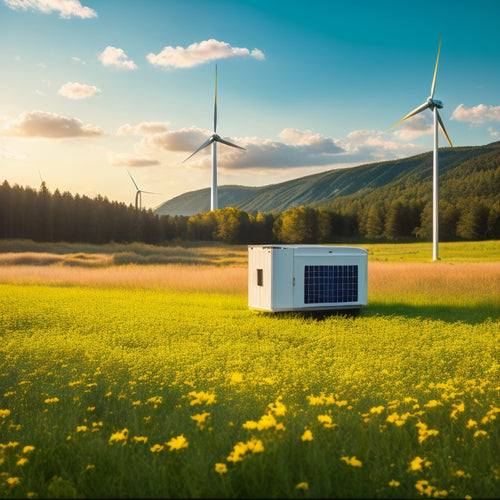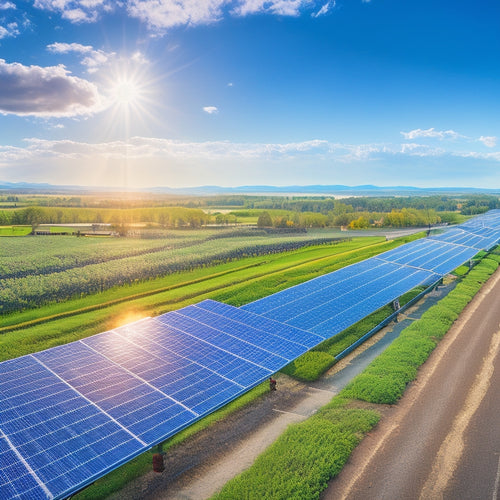
Solar Panel Battery Backup for House
Share
You can guarantee a reliable power supply during outages with a well-designed solar panel battery backup system, storing excess energy generated during the day for night use or emergency situations. This setup provides grid independence and increased security, avoiding lost productivity, spoiled food, and compromised safety. By understanding your daily power consumption and appliance prioritization, you can accurately size your battery backup system. With the right deep cycle battery technology and proper maintenance, you'll extend the lifespan of your system. Now, take the next step in exploring the complexities of solar panel battery backup systems for your home.
The Essentials
- A solar panel battery backup system provides reliable power during outages, storing excess energy generated during the day for night use or emergencies.
- Integrating solar panel battery systems can eliminate 3-4 tons of CO2 annually, supporting sustainable living goals and reducing greenhouse gas emissions.
- Accurate energy demand calculation is essential for sizing battery backup systems, considering daily power consumption and appliance prioritization for essential load.
- Proper maintenance, including temperature control and avoiding deep discharges, can significantly extend battery lifespan, ensuring long-term reliability and cost-effectiveness.
- A well-designed system ensures a steady supply of electricity when the grid fails, providing grid independence, increased security, and peace of mind for homeowners.
Reliable Power During Outages
You expect your solar panel battery backup system to provide reliable power during outages, and it's crucial to understand the backup power solutions and energy storage systems that make this possible.
With a battery storage system, you can store excess energy generated by your solar panels during the day to use at night or during power outages Energy Storage Solutions.
A well-designed system guarantees you have a steady supply of electricity when the grid goes down.
Backup Power Solutions
A reliable backup power solution is essential for homeowners who want to guarantee their solar panels continue generating electricity during power outages. You're not just investing in a solar panel system; you're investing in grid independence.
With a backup power solution, you can make certain that your home remains powered during outages, providing you with the freedom and security you need. By providing a reliable source of backup power during outages, keeping your essential appliances and lights running even when the grid goes down, you can avoid the hassle of lost productivity, spoiled food, and compromised safety Reliable Electricity Supply.
When selecting a backup power solution, consider the renewable incentives available. Many governments offer incentives for homeowners who invest in renewable energy systems, including solar panel battery backup systems. These incentives can help offset the cost of your investment, making it more affordable to achieve grid independence.
A backup power solution typically includes a battery bank, an inverter/charger, and a monitoring system. The battery bank stores excess energy generated by your solar panels during the day, which can then be used to power your home during outages.
The inverter/charger converts the DC power from your solar panels to AC power for your home, while the monitoring system allows you to track your energy usage and system performance.
With a reliable backup power solution, you can feel confident that your home will remain powered, even when the grid goes down.
Energy Storage Systems
Energy storage systems play an essential role in ensuring reliable power during outages. When you invest in a solar panel battery backup system, you're not just generating clean energy – you're also storing it for later use. This means you'll have power when you need it most, even during grid outages.
Additionally, with advanced home power backup systems, you can maximize your renewable energy and reduce your reliance on the grid Grid Tie Storage. You'll be able to store excess energy generated during the day for use at night or during power outages. This level of energy management gives you control over your energy usage and reduces your reliance on the grid.
When it comes to storage solutions, you have options. You can choose from a range of battery types, capacities, and configurations to suit your specific needs. Whether you're looking to power a few essential appliances or your entire home, there's a storage solution that can provide the dependable backup power you need.
Reduced Carbon Footprint Guaranteed
You're switching to a cleaner, more sustainable energy source with solar panel battery backup, which assures a reduced carbon footprint.
By utilizing the power of the sun, you'll reduce your reliance on fossil fuels, resulting in a significant decrease in greenhouse gas emissions.
With the ability to store excess energy generated during the day for use during outages off-grid systems, you can provide a steady supply of electricity while minimizing your environmental impact.
Additionally, systems like Tesla Powerwall and LG Chem offer a reliable solution for homeowners seeking to reduce their carbon footprint.
With this eco-friendly energy solution, you can expect a lower emissions assurance, making it an attractive option for environmentally conscious homeowners.
Eco-Friendly Energy Source
Frequently, homeowners seeking a reliable and environmentally responsible power solution turn to solar panel battery backup systems, which guarantee a reduced carbon footprint.
You're making a conscious decision to switch to a cleaner, more sustainable source of energy. With solar energy benefits, you're not only reducing your reliance on the grid but also contributing to a healthier planet.
By adopting solar panel battery backup systems, you're embracing sustainable living. You're utilizing the power of the sun to fuel your daily needs, reducing your carbon emissions and minimizing your impact on the environment.
This eco-friendly energy source is particularly appealing to those who value freedom from fossil fuels and the ability to generate their own power.
With a solar panel battery backup system, you'll enjoy a consistent supply of electricity, even during power outages or grid failures.
You'll also benefit from lower energy bills, as you're generating your own clean energy. By choosing this eco-friendly energy source, you're taking a significant step towards a more sustainable future.
Lower Emissions Guarantee
By integrating a solar panel battery backup system into your home, approximately 3-4 tons of carbon dioxide emissions can be eliminated annually, markedly reducing your carbon footprint.
This significant emission reduction is a major step towards sustainable living, allowing you to live more eco-consciously while minimizing your reliance on the grid.
With a solar panel battery backup system, you can rest assured that you're doing your part to reduce greenhouse gas emissions and mitigate climate change.
Deep Cycle Battery Technology
You're likely wondering what to expect from your deep cycle battery's lifespan and performance.
When considering top residential solar batteries, it's crucial to evaluate the lifespan and performance of each option.
Regarding battery lifespan expectations, you can expect a deep cycle battery to last anywhere from 5 to 15 years, depending on factors like usage and maintenance.
With respect to cycle life performance, a high-quality deep cycle battery can handle 2,000 to 5,000 charge cycles, making it a reliable choice for your solar panel battery backup system.
Battery Lifespan Expectations
When sizing a solar panel battery backup system, understanding the lifespan expectations of deep cycle batteries is crucial to guaranteeing a reliable and cost-effective solution.
You'll want to take into account the average lifespan of your batteries, which can range from 5 to 15 years depending on the type, quality, and usage. Proper battery maintenance tips, such as keeping the batteries at room temperature, avoiding deep discharging, and assuring correct charging, can greatly extend their lifespan.
Regularly monitoring your batteries' state of health and performing routine maintenance tasks can help identify potential issues before they become major problems.
You should also plan for battery replacement options, as eventually, you'll need to replace your batteries. Knowing your options and budgeting for replacements can help you avoid costly surprises down the line.
Cycle Life Performance
Deep in the heart of deep cycle battery technology lies cycle life performance, a vital aspect that greatly impacts the overall reliability of your solar panel battery backup system. Cycle life performance refers to the number of charge and discharge cycles your battery can handle before its capacity degrades. This metric is significant, as it affects your system's overall efficiency and lifespan.
| Cycle Life Performance | Impact on System |
|---|---|
| High cycle efficiency | Increases overall system efficiency and lifespan |
| Low maintenance requirements | Reduces downtime and extends system lifespan |
| Proper charging and discharging | Prevents premature battery degradation |
To optimize cycle life performance, it is important to follow proper maintenance tips. Confirm your batteries are charged and discharged within the recommended depth of discharge (DOD) range. Avoid extreme temperatures, and keep your batteries clean and dry. By doing so, you can maximize your battery's cycle life, guaranteeing your solar panel battery backup system operates at peak performance.
Calculate Your Energy Demands
To determine the right solar panel battery backup system for your needs, you'll need to calculate your daily power consumption in watt-hours (Wh).
Start by identifying your essential appliances and their corresponding power ratings, then prioritize them based on importance to guarantee you have a reliable backup power supply during outages.
With the rise of renewable energy systems, homeowners can now enjoy a more sustainable and efficient way of storing energy.
Daily Power Consumption
About 30 kilowatt-hours (kWh) of electricity are used daily by an average American household, making it vital to accurately calculate your energy demands for a solar panel battery backup system. Understanding your daily power consumption is important to determining the right size of the battery backup system that meets your energy needs.
To calculate your energy demands, you need to analyze your consumption patterns and identify areas of energy efficiency. Start by tracking your daily energy usage for a week or a month to get an accurate representation of your energy consumption. Make a list of all your appliances, their wattage, and the number of hours they're used daily.
| Appliance | Wattage | Daily Usage Hours |
|---|---|---|
| Refrigerator | 150 W | 24 hours |
| TV | 100 W | 4 hours |
| Lights | 60 W | 8 hours |
| Laptop | 65 W | 2 hours |
Essential Appliance Priority
You've calculated your daily energy usage, now it's time to prioritize which appliances you need to power during an outage. This vital step is known as appliance prioritization, and it's fundamental in determining your essential load. Your essential load is the total power required to run the most important appliances in your home.
Start by identifying the must-haves, such as your refrigerator, medical equipment, and lighting. Then, consider the nice-to-haves, like your TV and computer. Be honest with yourself – if you can survive without it during an outage, it's not essential.
Next, calculate the power requirements for each essential appliance. You can find this information in the owner's manual or on the manufacturer's website.
Add up the total power required to determine your essential load. This will give you a clear understanding of the minimum capacity your solar panel battery backup system needs to provide.
Longer Cycle Life Guarantee
You're looking for a solar panel battery backup system that can provide reliable power for years to come, and a longer cycle life guarantee is essential to achieving this goal.
Extending Battery Longevity
Frequently, solar panel battery backup owners overlook a crucial aspect of their system's maintenance: extending battery longevity. You want to guarantee your system lasts for years to come, and proper maintenance is key. By following these battery maintenance tips, you can increase charging efficiency and prolong the life of your batteries.
| Battery Maintenance Tips | Benefits |
|---|---|
| Monitor temperature | Prevents overcharging and undercharging |
| Avoid deep discharging | Reduces wear and tear on batteries |
| Keep batteries clean | Guarantees proper airflow and heat dissipation |
| Update software regularly | Optimizes charging efficiency and performance |
Frequently Asked Questions
Can I Use My Existing Solar Panels With a Battery Backup System?
You can retroactively integrate a battery backup system with your existing solar panels, but it'll require a compatible inverter and energy storage configuration, ensuring seamless battery integration for ideal energy storage and backup power.
How Long Does It Take to Install a Solar Panel Battery Backup?
Like a skilled conductor leading an orchestra, you'll steer the installation timeline. Typically, the installation process takes 1-3 days, depending on the complexity of your setup and the number of batteries being installed, ensuring a harmonious blend of power and freedom.
Are Solar Panel Battery Backups Compatible With Grid-Tied Systems?
You'll be pleased to know that yes, solar panel battery backups are compatible with grid-tied systems, allowing you to achieve grid independence while utilizing energy storage, giving you control over your power and freedom from utility constraints.
Can I Charge My Electric Vehicle With a Solar Panel Battery Backup?
You can charge your electric vehicle using a solar panel battery backup, leveraging EV charging capabilities while optimizing solar efficiency, ensuring a sustainable and independent energy source that fuels your freedom on the road.
Do Solar Panel Battery Backups Require Regular Maintenance?
Think of your battery backup like a car - regular tune-ups guarantee a smooth ride. You'll want to inspect and clean your batteries every 3-6 months to optimize performance and extend their 10-15 year lifespan, requiring maintenance every 6-12 months on average.
Final Thoughts
You've got the power to take control of your energy needs, rain or shine. With a solar panel battery backup for your house, you'll be sitting pretty when the grid goes down. By cutting the cord from fossil fuels, you'll reduce your carbon footprint and breathe easy. Calculate your energy demands, invest in deep cycle battery technology, and enjoy a longer cycle life guarantee. When the going gets tough, your backup system will be the ace up your sleeve, providing reliable power during outages.
Related Posts
-

Sustainable and Eco-Friendly Generators for a Reduced Carbon Footprint
Sustainable and eco-friendly generators are perfect for cutting your carbon footprint and increasing energy efficienc...
-

Applications of Photovoltaic Systems
Photovoltaic systems are versatile, converting sunlight into electricity for various applications. You can use them i...
-

Replacing Old Appliances With Sustainable Alternatives
Replacing old appliances with sustainable alternatives can change your home into an energy-efficient space. Not only ...


